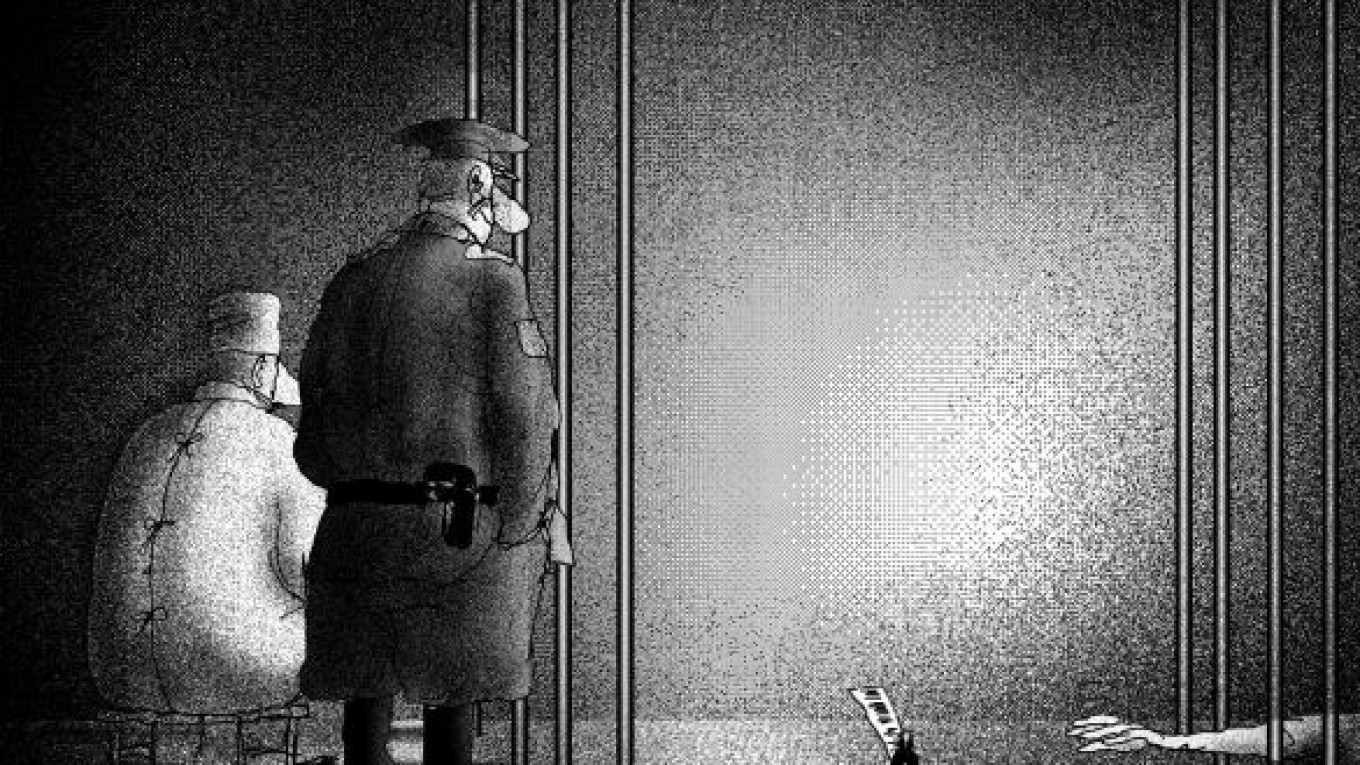After President Dmitry Medvedev’s state-of-the-nation address, we were planning to write about whether it is possible to carry out modernization in Russia without political liberalization. But last week’s tragic death of lawyer Sergei Magnitsky in a pretrial detention facility pushed all other issues aside.
We know that readers have been given exhaustive information about this incident in recent days, but we cannot refrain from writing about it because it would be absolutely pointless to discuss any other aspect of modernization without first addressing Magnitsky’s death. What difference does it make if the stock market is up or down or what is happening with interest rates and exchange rates if no value is placed on human life? Does it make sense to speak about honoring contractual agreements if one side can take the other side’s lawyer hostage? Why discuss ownership rights when owners are denied the right to life?
Judging by available information, Magnitsky died after fulfilling his professional duties. He worked within the framework of the law while trying to defend the interests of his client, William Browder, head of Hermitage Capital. Browder never criticized Vladimir Putin when he was president. In fact, during the Yukos case, Browder tirelessly spoke out on the side of the Russian authorities. But that did not help him in the end. His fight for the rights of the shareholders of a Russian hydrocarbon company cost him the right to enter Russia. The Russian budget lost far more. The case on which Magnitsky was working and that led to his imprisonment ended with people from the siloviki seizing three companies from Browder and then using them to rob Russian taxpayers of 5 billion rubles ($173.4 million).
Since Browder’s enemies did not want to, or could not, retaliate against him, they arrested his lawyer. When the authorities denied medical treatment to Magnitsky after he complained of chest pains, they were guilty of torture. Article 1 of the United Nations Convention against Torture and Other Cruel, Inhuman or Degrading Treatment or Punishment defines torture precisely in that way. It states that “the term ‘torture’ means any act by which severe pain or suffering, whether physical or mental, is intentionally inflicted on a person for such purposes as obtaining from him or a third person information or a confession, punishing him for an act he or a third person has committed or is suspected of having committed, or intimidating or coercing him.” Russia is a signatory to that convention.
In this sense, law enforcement officials in Russia employ essentially the same methods as the notorious NKVD did in 1937. Up until last week, we knew that torture was frequently used in the country’s detention centers, but we convinced ourselves that it did not concern us personally. Now, if we are honest with ourselves and our children, we must acknowledge that this problem concerns everyone.
We already knew that it is dangerous to be an opposition politician, an independent journalist or a human rights activist in Russia. We thought that it was safe to stay out of politics and simply work in your chosen profession. At least, that is probably what Magnitsky thought. He did not die at the hands of some unknown hired assassin, but at the hands of the state. This is the same state to which we — including Magnitsky — pay our tax money.
You can talk all you want about trying to halt Russia’s brain drain or how to convince Russian specialists working abroad to return home. But the fate suffered by Magnitsky and former Yukos vice president Vasily Aleksanyan, a Harvard Law School graduate, sends a clear signal to all professionals: Russia can be a very hostile, if not dangerous, place to work. Will current or future Russian students enrolled in top foreign university and graduate programs want to return to this country after graduating? And yet this is the talent base that Medvedev wants to tap to carry out his modernization program. The parallels with the 1930s are uncanny: The Soviet Union also invited foreign specialists to help modernize its industrial base, and many of them later became victims of Stalinist repression.
Magnitsky was a citizen of Russia. We don’t know whether he voted for Medvedev in 2008, but only a few days before Magnitsky died, the president said during his state-of-the-nation address: “In the 21st century, our country once again needs to undergo comprehensive modernization. This will be our first ever experience of modernization based on democratic values and institutions.”
The president probably wanted to highlight the difference between current plans for modernization and Josef Stalin’s ruthless industrialization program. But after learning about Magnitsky’s death, it is difficult to avoid the fact that today’s Russia evokes disturbing memories of 1937.
Sergei Guriev is the Morgan Stanley Professor of Economics and rector of the New Economic School. Aleh Tsyvinsky is a professor at Yale University and the New Economic School. This comment appeared in Vedomosti.
A Message from The Moscow Times:
Dear readers,
We are facing unprecedented challenges. Russia's Prosecutor General's Office has designated The Moscow Times as an "undesirable" organization, criminalizing our work and putting our staff at risk of prosecution. This follows our earlier unjust labeling as a "foreign agent."
These actions are direct attempts to silence independent journalism in Russia. The authorities claim our work "discredits the decisions of the Russian leadership." We see things differently: we strive to provide accurate, unbiased reporting on Russia.
We, the journalists of The Moscow Times, refuse to be silenced. But to continue our work, we need your help.
Your support, no matter how small, makes a world of difference. If you can, please support us monthly starting from just $2. It's quick to set up, and every contribution makes a significant impact.
By supporting The Moscow Times, you're defending open, independent journalism in the face of repression. Thank you for standing with us.
Remind me later.


